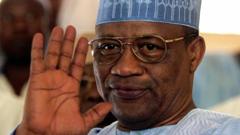**Despite hopes of reform, a recent assault by a young MP reveals deep-rooted entitlement issues in Nigeria's political landscape.**
**Outrage Over Political Abuse: Nigerian MP's Violent Encounter Sparks Debate on Generational Change**

**Outrage Over Political Abuse: Nigerian MP's Violent Encounter Sparks Debate on Generational Change**
**The incident raises questions about the persistence of power abuse among younger Nigerian politicians.**
In a shocking incident that has ignited public outrage, Nigerian politician Alex Ikwechegh was caught on camera slapping and verbally abusing a food delivery taxi driver, showcasing a troubling pattern of power abuse that seems to transcend generational boundaries. The 42-year-old Ikwechegh, who hails from the opposition All Progressives Grand Alliance (APGA) and represents Aba in the House of Representatives, was heard threatening the driver, declaring, “Do you know who I am?... I can make you disappear in this whole country, and nothing will happen.” This altercation erupted when the driver asked Ikwechegh to step outside to collect his order rather than bring it inside.
The disturbing footage went viral, forcing Ikwechegh to issue a public apology—a stark contrast to his brazen and intimidating demeanor recorded in the video. The incident highlights a common issue in Nigeria where officials, often referred to as "big men," intimidate ordinary citizens with the prevalent phrase, "Do you know who I am?" This culture of entitlement is further exemplified by politicians who travel in large convoys, often accompanied by police escorts and blaring sirens, coercing regular traffic to yield to their passage.
Ikwechegh’s actions are particularly disheartening because they come at a time when many Nigerians hoped for significant change. The "Not Too Young to Run" campaign, initiated by civil society groups, aimed to energize the political landscape by encouraging younger generations to participate actively. The initiative successfully lowered the age of candidacy, leading to a notable increase in youthful candidates, raising the percentage from six to twenty-seven in just one cycle.
Given Nigeria’s youth-centric demographic—over 70% of the populace is under 35—the expectation was that younger leaders would discard entrenched behaviors of oppression. However, Ikwechegh’s case, reminiscent of past abuses by figures such as Elisha Abbo, suggests the opposite, revealing that youthful politicians may merely be eager to perpetuate the same oppressive dynamics they were once critical of.
This troubling trend urges reflection on whether younger leaders are inheriting a cycle rather than instigating meaningful change. The analogy of school hierarchies comes to mind, where juniors dream of wielding power but eventually replicate the bullying behavior they once despised as they assume authority.
Following public outcry, Nigeria’s House of Representatives referred Ikwechegh to the Ethics and Privileges Committee amidst accusations of misconduct. He has also faced legal charges, including threats and abuse of public office. This unfolding scenario serves as a stern reminder that entitlement and impunity remain deeply ingrained in Nigeria’s political fabric—issues that mere generational change cannot swiftly rectify.
The disturbing footage went viral, forcing Ikwechegh to issue a public apology—a stark contrast to his brazen and intimidating demeanor recorded in the video. The incident highlights a common issue in Nigeria where officials, often referred to as "big men," intimidate ordinary citizens with the prevalent phrase, "Do you know who I am?" This culture of entitlement is further exemplified by politicians who travel in large convoys, often accompanied by police escorts and blaring sirens, coercing regular traffic to yield to their passage.
Ikwechegh’s actions are particularly disheartening because they come at a time when many Nigerians hoped for significant change. The "Not Too Young to Run" campaign, initiated by civil society groups, aimed to energize the political landscape by encouraging younger generations to participate actively. The initiative successfully lowered the age of candidacy, leading to a notable increase in youthful candidates, raising the percentage from six to twenty-seven in just one cycle.
Given Nigeria’s youth-centric demographic—over 70% of the populace is under 35—the expectation was that younger leaders would discard entrenched behaviors of oppression. However, Ikwechegh’s case, reminiscent of past abuses by figures such as Elisha Abbo, suggests the opposite, revealing that youthful politicians may merely be eager to perpetuate the same oppressive dynamics they were once critical of.
This troubling trend urges reflection on whether younger leaders are inheriting a cycle rather than instigating meaningful change. The analogy of school hierarchies comes to mind, where juniors dream of wielding power but eventually replicate the bullying behavior they once despised as they assume authority.
Following public outcry, Nigeria’s House of Representatives referred Ikwechegh to the Ethics and Privileges Committee amidst accusations of misconduct. He has also faced legal charges, including threats and abuse of public office. This unfolding scenario serves as a stern reminder that entitlement and impunity remain deeply ingrained in Nigeria’s political fabric—issues that mere generational change cannot swiftly rectify.




















